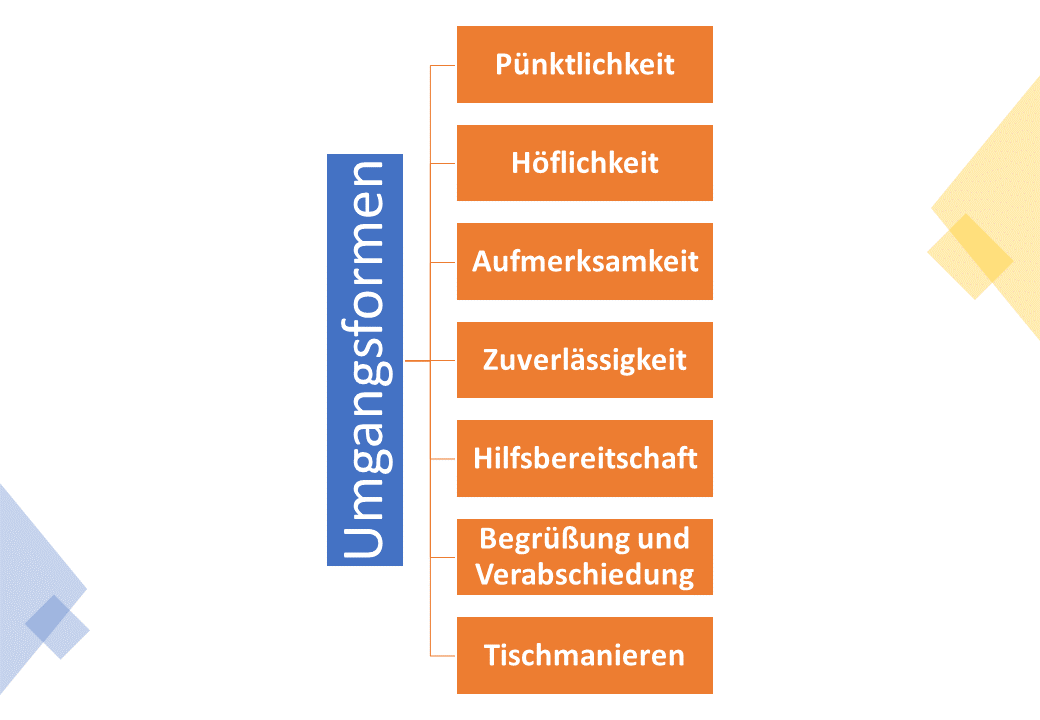Good Manners
Follow these rules for easy and positive interactions!
We all know and use them every day - manners. But what does this word actually mean?
Manners refer to both "good" and "bad" behavior when interacting with others. This includes word choice, tone, demeanor, and behavior. We learn good manners and proper behavior early in life from our parents and social environment.
In a group, valuing the same manners can create a sense of belonging.
In this post, we'll look at some of the most important manners in the workplace.
Good Behavior at Work
If you think good manners are outdated at work, you're mistaken. Not only bosses value good behavior in their employees. Good manners are also crucial among colleagues for effective collaboration. Good behavior suggests competence and can significantly influence success.

Punctuality
First and foremost is punctuality. Arriving on time at the office and for meetings shows respect. This applies equally to bosses, employees, and colleagues.
Of course, traffic jams or train delays can make us late. It's not a big deal if we're occasionally late for an appointment. However, it shouldn't become a habit. It's also important to inform others in advance if you'll be late.
Politeness
A friendly and open demeanor is contagious. Those who are polite often receive politeness in return. The words "please" and "thank you" should be part of everyone's vocabulary and used regularly. Saying please and thank you shows respect for others. Holding the door open for a colleague is also part of being polite.
Attention
Listening attentively and maintaining eye contact during a conversation shows respect for the speaker. If you stare out the window, play on your phone, or interrupt the speaker, you're seen as inattentive and disrespectful.
Reliability
Reliability is essential at work. Being unreliable can quickly lead to disfavor with colleagues and bosses, risking your job.
Helpfulness
Whether sorting files or tackling a challenging task, offering help to colleagues earns goodwill. You can hope that this helpfulness will be reciprocated.

Greeting and Farewell
We've all experienced it - arriving at work and greeting a colleague with a friendly "Hi". But there's no response. Our mood sours, and we wonder why the colleague didn't greet us back. "Maybe they weren't raised well," we think. However, the colleague might just be lost in thought, having a bad day, or didn't hear the greeting. We shouldn't read too much into such situations.
In general, it's good manners to greet and say goodbye to others. In professional settings, many mistakes can happen. In meetings with superiors, it's wise to greet the highest-ranking person first. Formally, this is done with a firm handshake. Since the pandemic, this is less common. Maintaining eye contact and addressing people directly remains essential for good manners.
Table Manners
Smacking or slurping aren't considered good table manners. During lunch with colleagues or bosses, we should mind our behavior. This includes using a napkin, avoiding spills, and keeping our voice down.
Conclusion
Good manners are still highly valued in our society.
Often, they're distinguished by hierarchy or social status. This distinction is outdated and morally questionable. Good manners are for everyone and everyone deserves them!
We shouldn't abandon them after work but apply them in our free time too. This makes life easier and more positive, as most people respond positively to positive interactions. Who doesn't enjoy a friendly "Hello" during a jog or a nice chat while walking the dog in the park?
